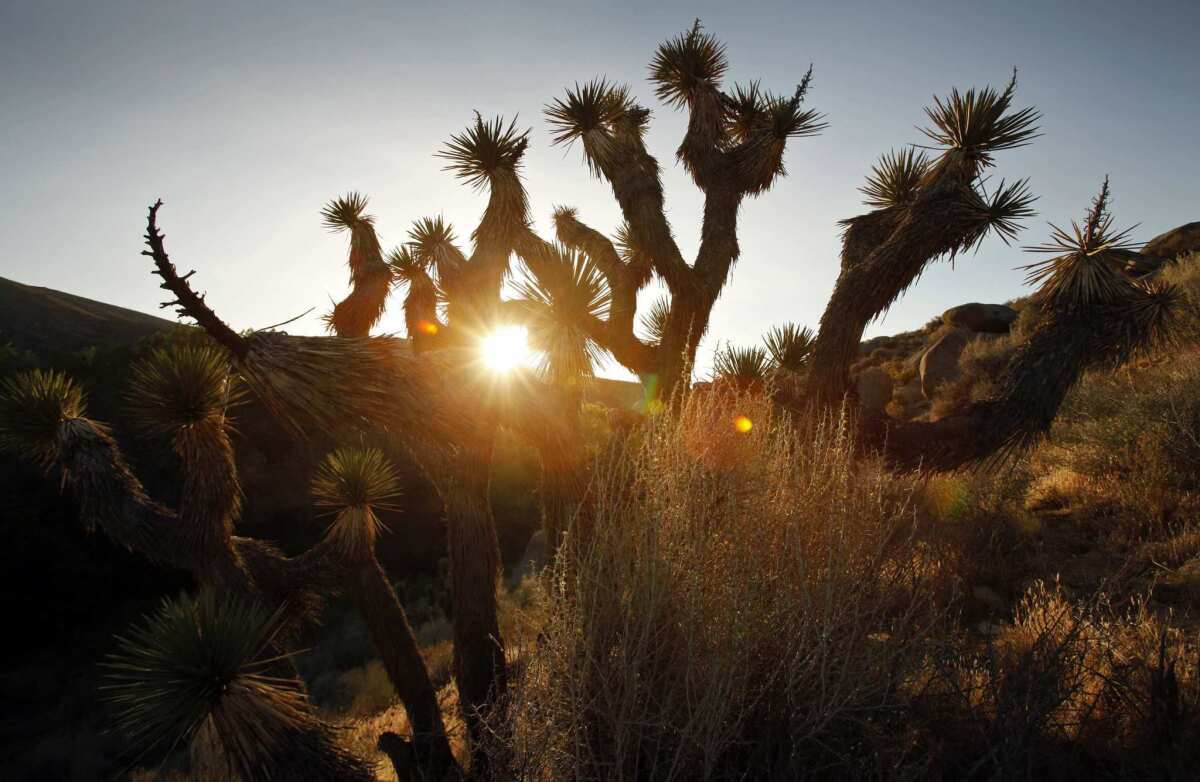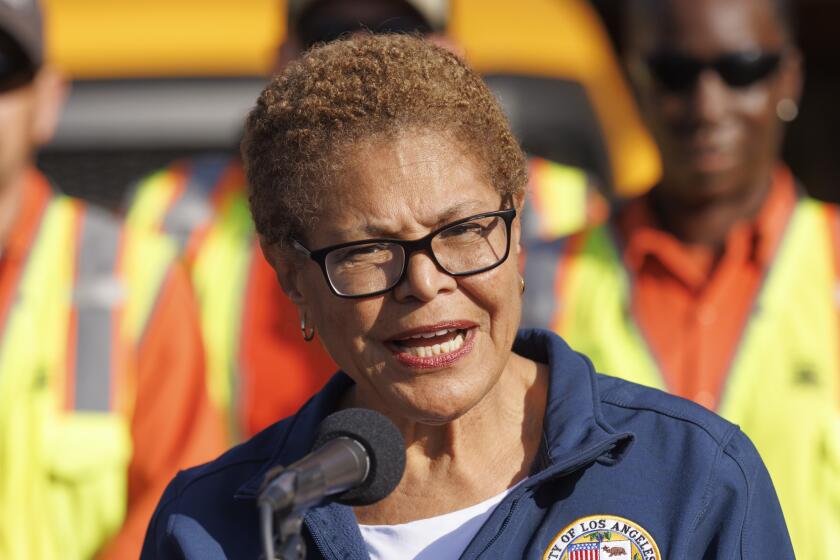Renewable energy corporations fight endangered species status for Joshua trees

- Share via
Renewable energy corporations have launched an eleventh-hour campaign to derail a petition seeking endangered species protection for Joshua trees, saying it could hinder development of the solar and wind power projects California needs to wean itself off fossil fuels.
Lawyers for the renewable energy industry say that by helping to eliminate greenhouse gas emissions, they are helping to mitigate climate change and the threat it poses to sensitive desert species such as the western Joshua tree.
For the record:
1:35 p.m. Aug. 18, 2020A previous version of this post attributed a quote to Sean Gallagher, vice president of state affairs at the Solar Energy Industries Assn. It was Randy Hoyle, chief development officer at Terra-Gen Power, who said, “We figure the number of Joshua trees that would be impacted would only be in the hundreds, potentially thousands. That’s an almost infinitesimal number compared with the overall population of Joshua trees.”
The state Fish and Game Commission on Aug. 20 is expected to vote on whether to accept the petition, which was filed by the Center for Biological Diversity. Approval has been recommended by state biologists.
As a candidate for listing, a species is temporarily afforded the same protections as a state endangered or threatened species.
“California needs a lot of solar energy facilities built in order to meet its renewable energy goals,” said Sean Gallagher, vice president of state affairs at the Solar Energy Industries Assn., in a recent interview.
“We figure the number of Joshua trees that would be impacted would only be in the hundreds, potentially thousands,” said Randy Hoyle, chief development officer at Terra-Gen Power, a renewable energy developer in the California desert.
“That’s an almost infinitesimal number compared with the overall population of Joshua trees.”
The center, however, charged that the industry’s argument is a smoke screen.
“We agree that climate change is a threat to Joshua trees and that we need to shift to clean energy as fast as possible,” said Brendan Cummings, the center’s conservation director and a resident of the community of Joshua Tree. “But there are far better places to do that — fallowed farmlands in the Central Valley, for instance — than on top of Joshua tree woodlands.”
“Yet for some reason,” he added, “renewable energy companies seem drawn to development on Joshua tree woodlands like moths to flame.”
A final decision by the five-member state panel is expected next year. If the trees are listed, the law requires state wildlife managers to devise a recovery plan, which could limit development across thousands of acres of southeastern California’s sunniest real estate.
About 40% of the western Joshua tree’s range is on private land where a state endangered-species law would apply, according to the petition, and includes the cities of Palmdale, Lancaster, Hesperia, Victorville and Yucca Valley.
Supporters of the petition include U.S. Sen. Dianne Feinstein (D-Calif.) and environmental organizations led by Sierra Club California, Hispanic Access Foundation, Vet Voice Foundation, the National Parks Conservation Assn. and Native American Land Conservancy.
“Joshua trees embody the spirit of the California desert,” Feinstein said in a recent letter to the commission, “and it is crucial that we preserve their unique, iconic beauty for future generations and for the health of fragile desert ecosystems.”
Just like environmental groups, most renewable energy companies, state and local lawmakers and communities across the region want to settle this fight as soon as possible.
Tapping the region’s renewable energy potential was a top priority of the Obama administration, which sought to ease the nation’s dependence on fossil fuels and curb global warming. More recently, the Trump administration has moved to limit restrictions on desert development. In addition, California is committed to shifting the state’s electricity system off fossil fuels by 2045.
But some opponents of the petition suggest that saving Joshua trees may not be as important as the economic consequences.
Terra-Gen Power, however, has asked the state commission to delay its vote until January so that state legislative committees can first investigate the implications of listing Joshua trees on state climate goals, energy projects, power purchase agreements and employment opportunities.
Before a commission vote on the matter, Terra-Gen Power said it wants state wildlife authorities to provide it with “clear, unambiguous” instructions on how to expedite permits to remove or destroy Joshua trees standing in the way of proposed renewable energy projects.
The center, however, wants the commission to stick to its current schedule. “We filed our petition 10 months ago,” Cummings said. “They had plenty of time to seek their permits.”
It’s a controversy that has reached a boiling point in Yucca Valley, where a recent public records request filed by community activist Ernesto Nevarez produced a trove of critical information.
“There have been 450 requests for permits to destroy, remove or alter a Joshua tree filed in the town of Yucca Valley over the past three years,” Nevarez said. “Every one of them was signed off on the same day they were filed. Not one was denied.”
“Now there’s a push to topple as many Joshua trees as possible before the commission votes on the petition,” said Nevarez, a former organizer for the International Longshore and Warehouse Union. “So far this year, there have been 147 applications for permits to deal with Joshua trees on private property, roughly twice the number filed the previous year.”
“This lamentable paper trail suggests,” he added, “that the Town of Yucca Valley, despite its arguments to the contrary, isn’t capable of properly handling its own permitting processes for dealing with sensitive species.”
The Yucca Valley Town Council has denounced the petition as unnecessary because the trees are already protected under city and county ordinances and within the nearby 800,000-acre Joshua Tree National Park.
In Yucca Valley, property owners are required to get a free native plant permit from the town in order to remove, relocate or trim a Joshua tree that interferes with an existing or planned structure, roadway or utility, or is hazardous to pedestrians.
So far this year, the town has approved the destruction of 213 Joshua trees and relocation of 169 others, according to the information gathered by Nevarez.
In a letter to Nevarez, Town Clerk Leslie Copeland said she could not find any records of citations, fines or prosecutions for violating Yucca Valley’s native plant ordinance over the last three years.







